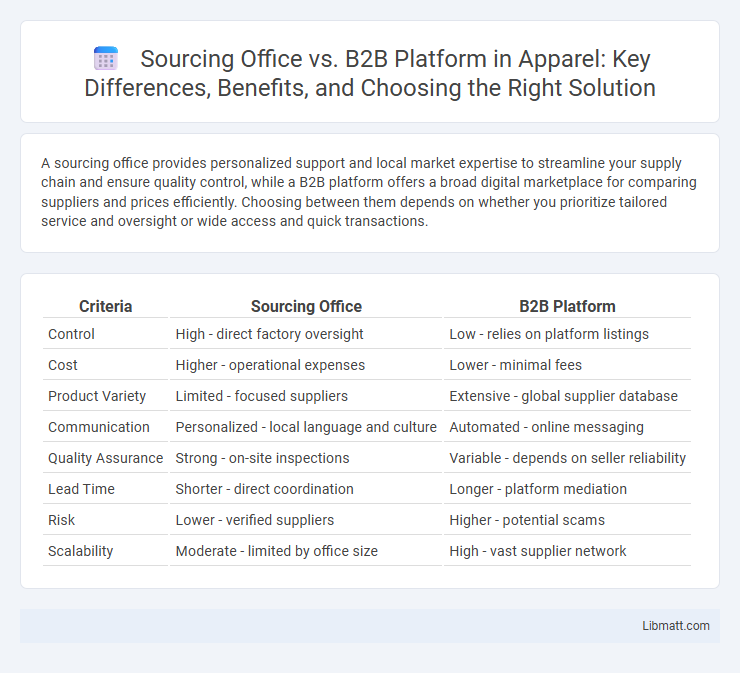A sourcing office provides personalized support and local market expertise to streamline your supply chain and ensure quality control, while a B2B platform offers a broad digital marketplace for comparing suppliers and prices efficiently. Choosing between them depends on whether you prioritize tailored service and oversight or wide access and quick transactions.
Table of Comparison
| Criteria | Sourcing Office | B2B Platform |
|---|---|---|
| Control | High - direct factory oversight | Low - relies on platform listings |
| Cost | Higher - operational expenses | Lower - minimal fees |
| Product Variety | Limited - focused suppliers | Extensive - global supplier database |
| Communication | Personalized - local language and culture | Automated - online messaging |
| Quality Assurance | Strong - on-site inspections | Variable - depends on seller reliability |
| Lead Time | Shorter - direct coordination | Longer - platform mediation |
| Risk | Lower - verified suppliers | Higher - potential scams |
| Scalability | Moderate - limited by office size | High - vast supplier network |
Understanding Sourcing Offices and B2B Platforms
Sourcing offices act as localized operational hubs that manage supplier relationships, quality control, and product development directly within manufacturing regions, providing personalized and hands-on assistance. B2B platforms facilitate digital marketplaces where businesses connect with multiple suppliers globally, streamlining product discovery, price comparison, and order management through online interfaces. Understanding these distinctions highlights sourcing offices' role in customized procurement solutions versus B2B platforms' efficiency for broad supplier access and transactional convenience.
Key Differences Between Sourcing Offices and B2B Platforms
Sourcing offices offer personalized, on-the-ground assistance to streamline supplier audits, quality control, and communication, whereas B2B platforms provide a digital marketplace connecting buyers with a wide range of suppliers globally. Your choice depends on whether you prioritize tailored supplier management and local expertise or access to extensive product catalogs with online transactions. Cost, control over procurement processes, and the level of supplier vetting also vary significantly between these two sourcing methods.
Advantages of Using a Sourcing Office
Using a sourcing office offers direct oversight of product quality, supplier verification, and negotiation processes, ensuring your business receives reliable and consistent results. A sourcing office provides localized market knowledge and faster response times to any production issues or changes, reducing risks and delays. Your company benefits from tailored supplier relationships and transparent communication that a B2B platform may not consistently offer.
Benefits of Engaging with B2B Platforms
Engaging with B2B platforms offers businesses unparalleled access to a diverse global supplier base, enabling efficient product sourcing and competitive pricing. These platforms provide real-time transaction transparency, secure payment systems, and integrated logistics support, streamlining the entire procurement process. Advanced data analytics and supplier verification tools on B2B platforms enhance decision-making, minimize risks, and boost supply chain reliability compared to traditional sourcing offices.
Cost Comparison: Sourcing Office vs B2B Platform
Sourcing offices typically require higher upfront investments, including office setup, staff salaries, and operational expenses, resulting in increased fixed costs compared to B2B platforms. B2B platforms usually operate on a subscription or transaction fee model, enabling your business to minimize initial expenses and pay based on actual usage, enhancing cost efficiency. While sourcing offices provide personalized service and direct supplier relationships, B2B platforms offer scalable, cost-effective solutions ideal for businesses managing tight budgets or fluctuating order volumes.
Quality Control and Assurance in Both Models
Sourcing offices provide direct oversight of suppliers, enabling rigorous quality control through on-site inspections and real-time issue resolution, ensuring product standards are consistently met. B2B platforms rely on supplier ratings, certifications, and third-party audits to assure quality, which can vary in reliability depending on platform transparency and verification processes. Both models prioritize quality assurance but differ in control intensity, with sourcing offices offering hands-on management while B2B platforms emphasize scalable verification methods.
Flexibility and Customization Options
Sourcing offices offer high flexibility and customization by providing tailored supplier vetting, personalized product development, and direct communication to meet your specific requirements. B2B platforms, while offering a wide range of suppliers and products, typically follow standardized processes with limited customization and less adaptability to unique business needs. Choosing a sourcing office ensures more control over sourcing strategies, enabling you to achieve precise product specifications and flexible negotiation terms.
Risk Management in Sourcing Office vs B2B Platform
A sourcing office offers direct oversight of supplier audits, quality control, and communication, significantly reducing risks related to product quality and delivery timelines. Conversely, B2B platforms present exposure to higher risks from counterfeit products, unreliable vendors, and transactional fraud due to limited vetting and control. Your business benefits more secure risk management with a sourcing office's hands-on approach compared to the often impersonal and less regulated environment of B2B platforms.
Speed and Efficiency of the Procurement Process
Sourcing offices streamline procurement by directly managing supplier relationships, ensuring faster order fulfillment and customized quality control. B2B platforms offer broad supplier access and automated comparison tools, accelerating the sourcing process but potentially requiring more time for vetting vendors. Your choice impacts procurement speed and efficiency, balancing direct oversight with digital convenience.
Choosing the Right Sourcing Solution for Your Business
Evaluating sourcing offices versus B2B platforms depends on your business needs, with sourcing offices offering personalized supplier management and quality control, while B2B platforms provide access to a vast supplier network and streamlined digital transactions. Your choice should consider factors such as product complexity, budget constraints, and desired level of oversight. Selecting the right sourcing solution ensures efficient procurement processes and strengthens your global supply chain.
Sourcing Office vs B2B Platform Infographic

 libmatt.com
libmatt.com